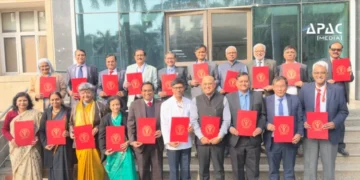New Delhi: The Lok Sabha passed the Income-Tax (No. 2) Bill, 2025, replacing the six-decade-old Income-tax Act, 1961, and the Taxation Laws (Amendment) Bill, 2025. Both bills were cleared by voice vote without debate on 11 August.
Finance Minister Nirmala Sitharaman said the new income-tax law is guided by the acronym S.I.M.P.L.E. – Streamlined structure and language; Integrated and concise; Minimised litigation; Practical and transparent; Learn and adapt; and Efficient tax reforms.
First introduced in February, the draft was reviewed by a select committee chaired by BJP MP Baijayant Panda, which made 285 suggestions, most of which have been incorporated. Panda said the new legislation halves the complexity of the existing law, which had over 4,000 amendments and more than five lakh words, and reduces unnecessary litigation for individuals and MSMEs.
The revised law simplifies language, clarifies deductions, strengthens cross-referencing across provisions, and resolves ambiguities around house property income, including standard deductions and pre-construction interest on home loans.
It also standardises definitions for terms like “capital asset,” “micro and small enterprises,” and “beneficial owner,” while aligning tax treatment for pension contributions and scientific research expenditures. The bill will take effect from 1 April 2026.
Key proposals include allowing tax refunds even for late filings, removing penalties for delayed TDS submissions, enabling advance “nil-TDS” certificates for taxpayers without liabilities and explicitly exempting certain commuted pensions from tax.
Deductions for inter-corporate dividends under Section 80M have been reinstated to avoid double taxation in multi-tier company structures. Property taxation rules have been revised to base valuations on the higher of reasonable expected rent or actual rent received.
The bill also aligns MSME definitions with the MSME Act, introduces a single “tax year” concept to replace the dual use of financial and assessment years, and removes obsolete provisions, such as the fringe benefit tax.
The Taxation Laws (Amendment) Bill, 2025, amends the Income-tax Act, 1961 and the Finance Act, 2025 and includes direct tax relief measures for Saudi Arabia’s sovereign wealth fund and its subsidiaries investing in India.
Earlier in the day, the Lok Sabha also passed the National Sports Governance Bill, 2025 and the National Anti-Doping (Amendment) Bill, 2025, while the Rajya Sabha cleared the Merchant Shipping Bill, 2024 and approved the Readjustment of Representation of Scheduled Tribes in Assembly Constituencies of Goa Bill, 2025.
The Upper House also returned three Manipur-related bills, the state budget for 2025–26, amendments to its GST Act, and an appropriation bill, to the Lok Sabha.



































































Discussion about this post